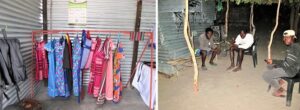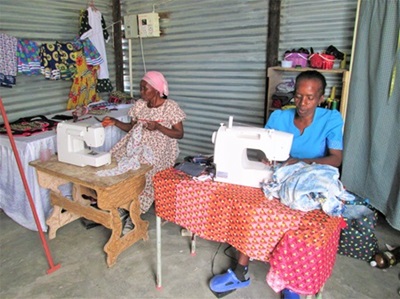
By Martin Negumbo|
Oshakati is the commercial centre of the northern part of Namibia, and it has acquired the attribute of being the second capital city of the country.
With such national institutions as Bank of Namibia branch, and the norther branch of the High Court of Namibia, Oshakati is the administrative centre of Oshana region, so that most government institutions and state agencies serving the northern regions have their offices in Oshakati.
Oshakati is where the Oshakati Intermediate State Hospital, the biggest hospital in the north, is located.
Oshakati is also strategically located, in the northern part of Oshana, close to the borders of both Ohangwena region and Omusati region.
With these attributes, Oshakati is not only the commercial centre of the north but also the magnet and collection point of people from across the northern regions of Namibia and southern Angola in search of waged labour, or in search of health services or educational opportunities.
This has made Oshakati to be a town with a growing population. And a growing demand for housing; leading to the growth of the town’s informal settlements.
Some of Oshakati’s famous and infamous informal settlements are Uupindi, Anghambiya (Oshoopala), Ompumbu, Evululuko, and Sky.
Omutumwa visited some of the locations like Evululuko and Uupindi, with the aim of asking the residents how life has been for them living in a shack house.
Frans Kangandjo told Omutumwa that he came in Oshakati in 2006 when he was 18 years old and he lived with his elder brother who had a shack at Sky location.
“The situation has never been good because we never had water at that time, not to talk of electricity,” Kangandjo narrated.
“As I grew up I left my brother’s shack some years later and I came to Uupindi (a semi-formal settlement in Oshakati West) where I found a space to erect my own shack.
“This is where I live now.”
Kangandjo is happy that he at least has a place he calls his own. “The challenge here is only lack of water supply at our shacks, and that most of us don’t have Erf numbers yet. And criminal activities, that is really a challenge as when you go out it is easy for thieves to break into your shack.”
Mrs Anna Nime, a 49 years old mother of three, lives in Evululuko, a semi-formal settlement in the eastern part of Oshakati. “I have been living here since 1996 after I left my parents’ home at Onangubu village in Ohangwena Region.
“I gave birth to all my three kids here.”
Despite having been living in Oshakati for 28 years Nime has never lived in a formal housing structure.
“All the years of my youth I have lived a life of struggle, together with my neighbour Julian, we have stayed in squatter camps. Our livelihoods have always been through hustling, such as by selling kapana or selling beer in our shack rooms.”
Things started to improve a decade ago when together with her friend they started a tailoring business.
“I learned tailoring and traditional clothing design, which made me start a home-based tailoring business,” Nime said. “This helped me extend my shack, adding another shack room where my business operates.
“I also taught my long-time friend and neighbour Julian, and now we are four tailors in this business using two sewing machines. We started with manual sewing machines and worked hard to have electricity installed in our shack-business for us to use electric machines.”
The women say they are now making good money, and are able to feed and pay school fees for their children without any help from the Government.
“We are happy to see the media coming to visit us and find out how we live here in the location of squatter camps.”
A young man of 22 years, Thomas Nicodemus, from Olungalunga village in Oshana region, told the newspaper that he has been living in Uupindi since last year.
“After I dropped out of school I decided to come and live here,” Nicodemus said. “I have been jobless, and in order to survive I recently started selling cigarettes and whiskeys imported from Angola, which are prohibited to be sold in Namibia.
“Due to the tough situation I started with drinking locally brewed alcohol to balance the situation.”
Omutumwa visited the offices of the town council of Oshakati, where neither the town’s Chief Executive Officer Mr Timoteus Namwandi nor the town’s chief public relations officer Ms Katarina Kamari were available.
However Ms Kamari told Omutumwa telephonically that most of the informal settlements of Oshakati have undergone some form of formalisation stages.
“And therefore a lot of households in those settlements have been supplied with water connection services and electricity,” Kamari said.
“And the town council is busy planning to do the same with others which are still left out.”
Kamari also pointed at the fact that several vacancy announcements for casuals and temporary jobs were (at the time of the visit of Omutumwa) posted on the council’s notice board.
“These are just for local residents of Oshakati, who are qualified to do certain contractual jobs. They should be aged between 25 to 50 and they should be unemployed.
“This will help a certain number of unemployed youths because the qualifications asked are from Grade 8 to 12.”

In the photo: Mrs Anna Nime, and her friend and business partner operating their tailoring business in their shack room at Evululuko, Oshakati East. Also in another image are unemployed young men relaxing in the afternoon at their shacks in Uupindi, Oshakati.

[NB. This article was produced with the financial support of the European Union. Its contents are the sole responsibility of Omutumwa and do not necessarily reflect the views of the European Union.]






